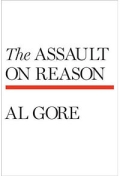
I don’t normally read political books, but I picked up former U.S. Vice President Al Gore’s The Assault on Reason on a whim because the premise sounded interesting. I was kind of hoping for a erudite discussion of how logic, science, and rationality have been disappearing from the American landscape. You know, like the debate (in finger quotes, that) over evolution, the subjection of science to politics or business, our near pathological fascination with celebrity gossip, and the erosion of our educational system when it comes to math, science, and related subjects.
Instead, as you may have already guessed, the book is about 10% all that stuff and 90% prolonged polemic against the Bush administration. Gore essentially takes the political headlines from the last six years or so and neatly arranges them in a way that clearly shows the current President’s offenses, most of which come from the displacement of public, reasoned debate and constitutional freedoms by a fanatical political doctrine and various cheap tricks. Nothing that Gore brings up should be news to anyone who watches The Daily Show, much less those who follow real news outlets (I won’t admit which group I fall into), but I found the impact of having everything stitched together in one cohesive narrative to be astounding.
Gore provides detailed examinations the Busch administration’s handling of things like the case for war in Iraq, the science behind the environmental crisis, the hurricane Katrina aftermath, state sponsorship of torture, suspension of habeas corpus, blocking of Federal judge appointments (the book was published before the allegations of their politically-based firings came out, but I’m sure it’d be in any future revisions), cronyism, the manipulation of the press, secrecy, and wire tapping. He then ties it all together with the common threads, such as the expansion of the Executive branch’s power, zealous political doctrines, reliance on special interests, and the erosion of opportunities for public debate fueled by reason and facts. When one looks at the whole picture using the road map Gore provides, it’s really quite damning. I mean, even more so.
Not everything that Gore said really rang true to me, though. One of his central, repeating themes is that the ability of Americans to become active participants in their democracy is hamstrung by the one-way nature of television as the dominant medium. This I don’t necessarily disagree with, though I think he overstates it. But what kept confusing me was how he seemed to think that the printed book and pamphlets that were the main outlet for political thought during the nation’s birth and infancy were much more conducive to two-way, reasoned debate. I understand that access to a printing press and a street corner on which to hand out your pamphlets was much easier than producing and airing a 30-second TV spot is today, but it’s still just one guy selling books or pamphlets. I don’t see the two-way communication that Gore says was going on there. It seems like he’s just looking for something supposedly more wholesome to contrast television against, which is all just a lead-up to what he sees as the real savior of reasoned political debates and exchanges: the Internet with all its blogs, social networking, videos, and assorted tubes.
All in all this was a really interesting read that I’m glad I went through. Gore comes across not as a whiner, but as a level-headed and amazingly intelligent observer of the big picture. I don’t believe all his arguments, but it’s nothing if not thought provoking.
Published by